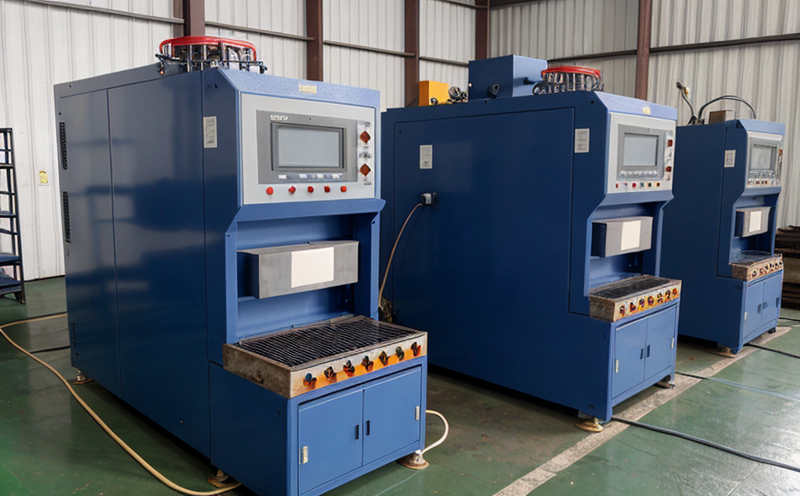JIS K0116 Trace Metals in Chemical Inputs Testing
The JIS K0116 standard is a critical part of ensuring that chemical inputs used in industrial manufacturing and processing are free from harmful trace metals. This testing method is designed to detect and quantify the presence of trace levels of metallic elements such as iron, copper, zinc, lead, cadmium, chromium, nickel, and tin in various raw materials.
Trace metals can have significant impacts on product quality, performance, and safety. For instance, excessive amounts of heavy metals like lead or cadmium can contaminate the final product, leading to health risks for consumers. In industries such as pharmaceuticals, food processing, and electronics manufacturing, where purity is paramount, even small quantities of these elements can degrade process efficiency or compromise product integrity.
The testing method specified in JIS K0116 involves several steps that are crucial for accurate results:
- Sample Preparation: The raw materials must be finely ground to ensure uniform distribution and ease of analysis. This step is critical as it affects the precision of subsequent measurements.
- Digestion: Samples undergo digestion using strong acids like nitric acid at elevated temperatures. This process breaks down organic matter, allowing for easier extraction and quantification of metal ions.
- Standardization: Known concentrations of metal standards are prepared to calibrate the analytical equipment accurately.
- Analytical Techniques: Inductively Coupled Plasma Optical Emission Spectroscopy (ICPOES) or Flame Atomic Absorption Spectrophotometry (FAAS) are commonly used for detecting and quantifying trace metals. These methods provide high sensitivity and precision, enabling accurate measurement of even minute quantities.
The acceptance criteria for JIS K0116 tests are stringent, ensuring that only materials meeting specified limits can pass inspection. Compliance with these standards is essential for maintaining product quality and adhering to regulatory requirements across multiple sectors including pharmaceuticals, electronics, and food processing.
Understanding the importance of trace metal testing underpins why this service is vital for industrial manufacturing processes. By leveraging JIS K0116, companies can ensure their supply chains are free from harmful contaminants while enhancing overall product quality.
Why It Matters
The significance of JIS K0116 trace metals testing cannot be overstated in the context of industrial manufacturing and processing. Ensuring that raw materials meet stringent purity standards is not just about meeting regulatory requirements; it's about safeguarding product quality, consumer safety, and operational efficiency.
For pharmaceutical companies, for example, the presence of even trace amounts of certain metals can lead to batch failures or recalls due to contamination issues. This could result in significant financial losses and damage to brand reputation. In electronics manufacturing, where precision is critical, any trace metal that affects conductivity or corrosion resistance must be rigorously controlled.
From a compliance perspective, adherence to JIS K0116 ensures that manufacturers meet international standards set by regulatory bodies. This not only facilitates easier market access but also builds trust with customers who expect consistent quality from suppliers. Additionally, for R&D teams working on innovative products, controlling trace metals is essential for optimizing product performance and ensuring long-term reliability.
The impact of trace metal testing extends beyond just the immediate manufacturing process; it influences supply chain management, procurement strategies, and ultimately contributes to sustainable business practices by promoting cleaner production methods. By investing in thorough quality checks like those conducted under JIS K0116, organizations demonstrate their commitment to excellence and responsibility towards stakeholders.
Eurolab Advantages
Eurolab offers unparalleled expertise and comprehensive services for JIS K0116 trace metals testing. Our team of highly qualified professionals is dedicated to providing accurate, reliable, and timely results that meet the highest industry standards.
We employ state-of-the-art instrumentation including advanced ICP-OES and FAAS equipment to ensure precision in our measurements. Our laboratories are equipped with facilities designed specifically for handling hazardous materials safely, allowing us to conduct tests under controlled conditions without compromising safety or accuracy.
Our commitment to quality is reflected in the robust calibration procedures we follow, ensuring that all analytical instruments remain accurate throughout their operational life. This approach guarantees consistent and repeatable results across multiple batches of samples from different suppliers.
In terms of turnaround times, Eurolab prides itself on offering fast yet thorough testing services. We understand the importance of timely feedback for decision-making processes within industrial environments. Therefore, our goal is to provide quick reports while maintaining the integrity of each test performed.
Furthermore, Eurolab's customer-centric approach ensures that we tailor our offerings to meet individual client needs whether it be through customized testing protocols or additional value-added services such as consultation on best practices for reducing trace metal contamination in manufacturing processes. By leveraging years of experience and cutting-edge technology, Eurolab remains at the forefront of providing top-tier quality assurance solutions.
International Acceptance and Recognition
The JIS K0116 standard is widely recognized internationally due to its rigorous requirements for detecting trace metals in chemical inputs. This recognition stems from its alignment with global standards such as ISO 9845, ASTM D3741, EN 14175, and others that emphasize the importance of purity in raw materials.
Many countries have adopted JIS K0116 because it provides a standardized approach to measuring trace metal content. This standardization helps streamline compliance processes for multinational corporations operating across various jurisdictions. It also facilitates smoother trade between nations by ensuring that all parties involved understand and adhere to the same criteria.
The international acceptance of JIS K0116 is further reinforced by its use in regulatory frameworks governing industries such as pharmaceuticals, electronics manufacturing, food processing, and more. Regulatory bodies worldwide rely on this standard when setting permissible limits for trace metals in finished products or intermediate materials used during production processes.
By participating in international forums that discuss standards related to raw material quality control, Eurolab actively contributes to the evolution of best practices within the industry. Our commitment to staying abreast of changes and advancements ensures that we continue offering relevant services that align with evolving global expectations.





